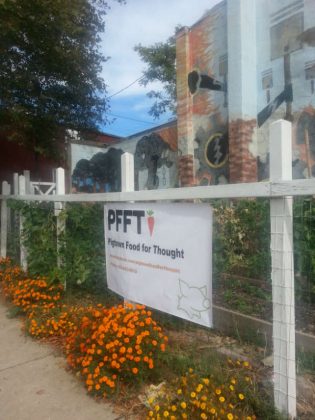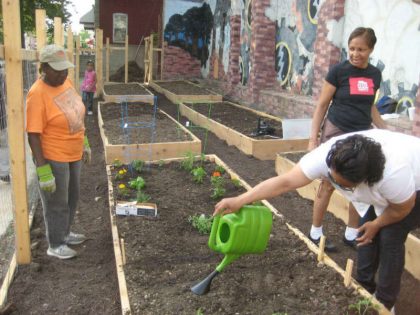Location
Baltimore, Maryland, USA
Community Description
Pigtown is a historically poor, diverse neighborhood in Southwest Baltimore that until recently was a food desert.
Pigtown Food for Thought is a neighborhood food justice group that was started by people in Pigtown to address food insecurity.
Pigtown Food for Thought has hosted many community meals, created pop-up grocery stores, hosted community cooking exchanges for kids, and started both a community garden and home gardening program where neighbors can grow food and learn about urban gardening.
 Problem Addressed
Problem Addressed
The broader problem is the lack of available food options in the city and a generation of kids who are growing up without even basic knowledge of how food grows and where their food comes from. Pigtown Food for Thought addresses this by getting kids gardening and sharing the joy and produce from the garden with everyone who walks by!
The more specific problem is that as with many urban gardens, finding clean water nearby is difficult. Until recently, there was access to a city water source, but that is no longer available.
Project Description
This project is to install a rainwater catchment system to provide water for the water needs of the community garden.
The system will consist of two rainwater catchment barrels to capture and store the water needed for the small community garden through the summer period.
The garden consists of six raised beds, arranged 2 x 3. The barrels will be placed in the middle so that they can be easily accessed. The plants will be watered by the participants with watering cans filled from the spouts attached to the barrels.
 Since the nearby houses have asphalt roofing, in addition to lead paint issues, it was determined that large funnels on top of the barrels will be used to capture the needed rainwater, rather than using a gutter system.
Since the nearby houses have asphalt roofing, in addition to lead paint issues, it was determined that large funnels on top of the barrels will be used to capture the needed rainwater, rather than using a gutter system.
The two 55-gallon plastic barrels will be purchased, delivered to the site, and placed on 8 cinder blocks. They will be fitted with funnels, made of food-grade, UV-resistant plastic to capture the maximum amount of water.
Project Impact
This project will directly benefit the 45 participants in the program. In addition, the entire neighborhood of Pigtown will get a deep sense of pride and pleasure from the community garden.
Project Director
The project is being led by Charlotte Keniston, Returned Peace Corps Volunteer.
Charlotte served as a Peace Corps Volunteer in Guatemala from 2008 to 2010. Her participation in the Shriver Peaceworker Fellows Program and the details of her involvement with Pigtown Food for Thought are reviewed on the National Peace Corps Association site in an article entitled Returned Volunteer Takes on Food Deserts of Baltimore.
Comments
After implementing 1,300 projects in 60 countries, Water Charity is thrilled to be able to introduce this project as our first in the continental United States. It brings to the forefront a number of issues of importance.
First and foremost it addresses an immediate need, is cost-effective, and uses the appropriate technology.
Secondly, it brings together two of the most important issues facing the world today: food security and access to water.
Thirdly, it highlights the Third Goal of the Peace Corps, for Volunteers to bring their overseas experience back to the United States.
Finally, it focuses attention on the work being done by one of the schools that has a program to provide benefits to Returned Peace Corps Volunteers under the Peace Corps Fellows Program.
Dollar Amount of Project
$400.00
Donations Collected to Date
$350.00
Dollar Amount Needed
$0.00 – This project has been funded through the generosity of the Elmo Foundation, in the amount of $350.00, and Sarah Albright, a longtime supporter of the work of Water Charity, in the amount of $50.00.
We encourage others to continue to donate using the Donate button below, and we will notify the Peace Corps Volunteer of your donation. Additional funds will be used to fund the next project by the PCV and/or those of other PCVs in the country of service.
This project has been finished. To read about the conclusion of the project, CLICK HERE.